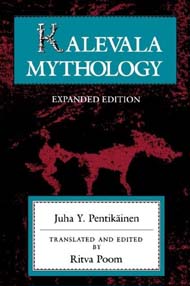Kalevala Mythology
Expanded Edition
Translated and edited by Ritva Poom
Juha Y. Pentikäinen
Published by Indiana University Press, 1999
The Kalevala, created during the 1830s and 1840s, is based on folklore collected
and compiled by Elias Lönnrot (1802-1884). It was the Kalevala that initiated the
proces leading to the foundation of Finnish identity during the nineteenth century,
thus influencing the formation of Finland as a nation. The Kalevala sheds light on
the general process involved in the formation of other epics, such as the Niebelungenlied,
the Edda, and the Homeric epics.
Pentikäinen's contribution to the study of international epic is relevant to the
field of classics, comparative literature, social history, and, of course, anthropology
and folkloristics.
Juha Y. Pentikäinen, Professor of Comparative Religion at the University of Helsinki,
has published numerous articles and twenty books. He has won two major folklore
prizes: the Chicago Folklore Prize (1978) for Oral Repertoire and World View, and
the Pitré Folklore Prize (1990) for the first edition of Kalevala Mythology.
Ritva Poom writes about Finnish and Estonian culture. Her translations of Finnish
and Estonian literature and ethnography have appeared in Literary Review, Scandinavian
Review, Drama Review, and Ethnologia Fennica. Her translation Fog Horses
received an award from the Columbia University Translation Center. She is the translator
of Estonian Short Stories and the recipient of fellowships from the National
Endowment for the Humanities and the National Endowment for the Arts.
"Pentikäinen's exceptional interdisciplinary study will richly reward those interested
in the dynamics of artistic creation and cultural construction, ethnic emergence and
political nationalism, and shamanistic belief systems."
- Robert Jarvenpa, American Anthropologist
"Kalevale Mythology is fluently translated by Ritva Poom and is expertly and imaginatively
illustrated. Folklorists and mythologists are indebted to Pentikäinen for an
informative and stimulating book."
- Martin Puhvel, Ethnohistory
(The text above comes from the back of the book)



